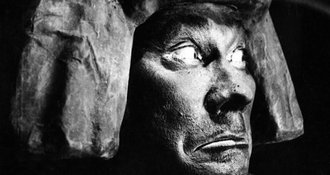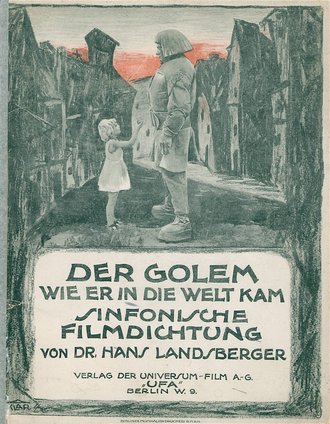»New« premiere of original »Golem« music
Film music from the »Weimar cinema« era previously believed to have been lost has been rediscovered: the original music to Paul Wegener’s expressionist classic »The Golem: How He Came into the World«. As part of the second Weimar silent film retrospective entitled »Überreizung der Phantasie« (»Overstimulation of the Imagination«), the Professorship for Media Studies at the Bauhaus-Universität Weimar is collaborating with the Lichthaus Kino, University Library, Weimar town archive and Kunstfest Weimar to host a »new« premiere at the Deutsches Nationaltheater in Weimar on Thursday, 3 September 2020.
In 1920, opulent orchestral music was commissioned for the film »The Golem: How He Came into the World« – a special case at the time. The music created by Jewish composer Dr. Hans Landsberger received the highest praise from film and music critics and helped to pave his way in the film industry. Landsberger was deported to Camp des Milles internment camp in 1940 and later transferred to Gurs internment camp where he died in 1941 under inhumane conditions. His work is almost unknown today; indeed, his compositions were considered lost. At the start of 2018, the Weimar silent film musician Richard Siedhoff managed an impressive reconstruction and re-orchestration of the music following the sensational discovery of the complete »Golem« piano direction and voice fragments. »The Golem« will now be performed again in its original form at the Kunstfest Weimar for the first time since the 1920s.
The Staatskapelle Weimar will accompany the »new« premiere with a cast in the typical style of a 1920s cinema orchestra. After the screening, Stefan Drößler from the Munich Film Museum will give a lecture entitled »Auf der Suche nach dem Golem« (»In Search of the Golem«) on the making of Wegener’s three »Golem« films and their elaborate film reconstruction. Richard Siedhoff will also speak about reconstruction of the rediscovered original music by Dr. Hans Landsberger.
»The Golem« – a Weimar cinema classic
Just one year after its founding, the Weimar Republic was already the scene of numerous crises and monumental events. With the migration of Eastern European Jews to the west due to the war, anti-Semitic hostility was growing. It was exactly at this time that the »Golem«, the powerful metaphor of Jewish self-deprecation, appeared on screens across the republic and provided the visual representation of a menacing helper that remains to this day.
Paul Wegener’s adaptation of the Jewish saga from the Prague ghetto is one of the most extraordinary artistic feats of Weimar cinema and is considered a milestone in the horror genre. The gloomy, distorted scenery by architect Hans Poelzig had a formative influence on Expressionist film architecture and attempts to achieve the dream of »artificial humans« continue to this day in the fields of cybernetics and biotechnology, androids, cyborgs and artificial intelligence.
»Überreizung der Phantasie« silent film retrospective
On 2–10 September 2020, the second Weimar silent film retrospective entitled »Überreizung der Phantasie« (»Over-stimulation of the imagination«) will review the Weimar cinema of 1920 based on the reconstructed programmes of two local cinemas, »Scherffs Lichtspielhaus« and »Reform Licht-Spiele«. Together with internationally acclaimed musicians and guests, the retrospective will offer comprehensive insights into one of the most influential periods in German filmmaking as it was presented to the citizens of Weimar exactly 100 years ago.
Event series: Second Weimar silent film retrospective – »Überreizung der Phantasie«
2–10 September 2020
Tickets and programme: www.kunstfest-weimar.de
Cinessage: Wednesday, 2 September 2020, 6:30 pm, Lichthaus Kino with Dirk Heinje (Lichthaus GmbH), Rolf C. Hemke (Kunstfest Weimar), Dr. Katrin Richter (Bauhaus-Universität Weimar), Richard Siedhoff (pianist at the Lichthaus Kino and silent film musician)
Film screening with the premiere of the reconstructed original music: »The Golem: How He Came into the World«
Thursday, 3 September 2020, 6 pm and 9 pm
Deutsches Nationaltheater, Großes Haus
Theaterplatz 2, 99423 Weimar
Tickets: www.kunstfest-weimar.de
Lecture by Stefan Drößler (Munich Film Museum): »Auf der Suche nach dem Golem« [»In Search of Golem«]
Friday, 4 September 2020, 6 pm
Lichthaus Kino
Am Kirschberg 4, 99423 Weimar
Organisers: Professorship for Film and Media Studies of the Faculty of Media at the Bauhaus-Universität Weimar, University Library at the Bauhaus-Universität Weimar, Lichthaus Kino, Weimar town archive, Kunstfest Weimar
Financial support: Thuringian State Chancellery, Sparkassenstiftung Weimar-Weimarer Land, Sparkasse Mittelthüringen, town of Weimar, Weimarer Republik e. V. (financed by the Federal Ministry of Justice and Consumer Protection), Bauhaus-Universität Weimar
Contact:
Dr. Simon Frisch
Professorship for Film and Media Studies
Faculty of Media at the Bauhaus-Universität Weimar
Tel.: +49 (0) 3643 / 58 37 37
Email: simon.frisch[at]uni-weimar.de
Dr. Katrin Richter
University Library
Tel.: +49 (0) 3643 / 58 28 03
Email: katrin.richter[at]uni-weimar.de
Kontakt
Bauhaus-Universität Weimar
Claudia Weinreich
Pressesprecherin
Tel.: +49(0)3643/58 11 73
Luise Ziegler
Mitarbeiterin Medienarbeit
Tel.: +49(0)3643/58 11 80
Fax: +49(0)3643/58 11 72
E-Mail: presse[at]uni-weimar.de
Web: www.uni-weimar.de/medienservice


